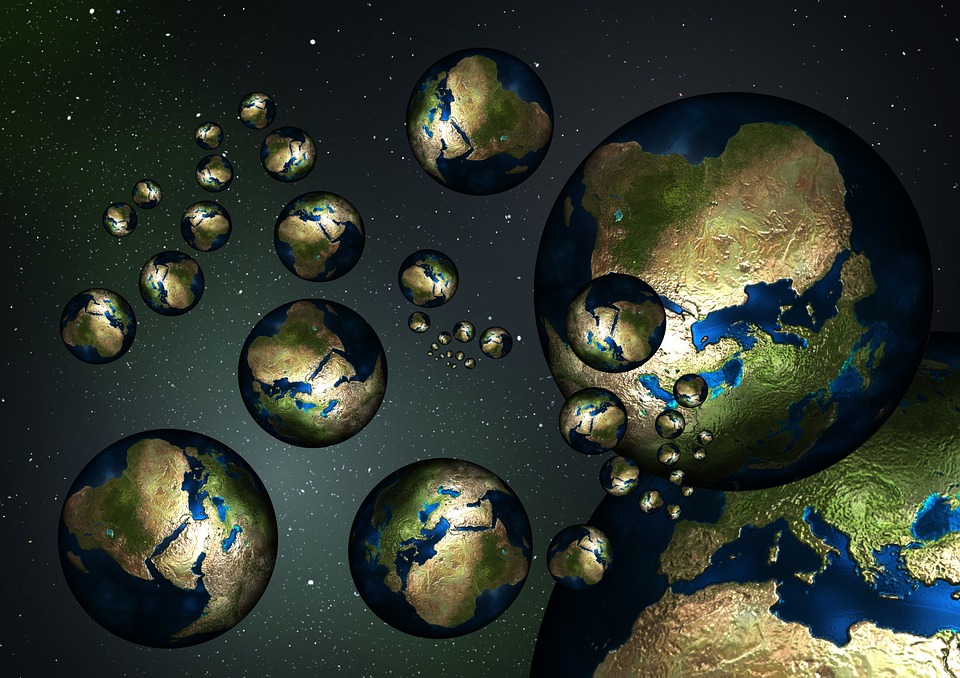The famous theologian G.K Chesterton once said “When men stop believing in God, they don’t believe in nothing; they believe in anything.” I have found that this is the logical implication of modern day atheism. In order to deny the existence of God, the atheists must affirm the existence of everything else. And when I say “everything” I mean literally “everything”. “Everything” in the broadest sense of the word possible.
The Fine Tuning of The Universe has been among the most powerful reasons to conclude that God exists for the past half century. Many of the physical constants and quantities are delicately balanced on a razors edge, such as the strong nuclear force, the weak nuclear force, the force of gravity, electromagnetism, and many more. If any of these physical laws were off by even a hair’s breadth, the universe never would have developed galaxies, stars, or planets, and in some cases, wouldn’t have even developed matter more complex than hydrogen. Life would be impossible. The odds that all of these constants and quantities could have fallen into the ranges needed for the development of life to be possible is so fantastically improbable that absurd illustrations are needed to help non-mathematicians like myself grasp the huge numbers. For a more in depth look at the fine tuning, check out my article “The Fine Tuning Argument For God’s Existence (Updated Version)” and my book Inference To The One True God.
Any sane person would never attribute the fine tuning to chance alone. Only an irrational person would do that. However, atheists try to get around the rational inference to divine design by positing that our universe is not the only one. There are an infinite number of universes in existence, and therefore, statistically speaking, the odds of one of those universes being finely tuned is not only probable, but certain. Among the reasons why this infinite universe theory fails to make chance a plausible explanation are 1): there’s absolutely no evidence that any universe other than our own exists, 2): This would not only make a design inference to the fine tuning invalid, but a design inference for everything invalid. You couldn’t even conclude a Boeing 747 was designed by intelligent agents because you could appeal to the multiverse. 3): Occam’s Razor would favor God over the multi-verse because it posits fewer necessary explanatory agents.
But one logical implication I don’t always talk about when rebutting The Multiverse Hypothesis is the logical implications it has for the existence of things. Statistically, if there are an infinite number of universes in existence, then even the most improbable of improbable events will occur. This is the argument the atheist makes in favor of chance being the explanation for the fine tuning. However, not only would fine tuning occur in some universes, but virtually everything would occur in at least some universe.
If the atheist wants to argue that there are an infinite number of univeres in existence, then he is unwittingly affirming the existence of unicorns, leprachans, ogres, fairies, the Sasquatch, dragons, and all sorts of other creatures he considers mythical. After all, there’s got to be at least one universe where evolution produced these sorts of creatures through natural selection acting on random mutations through billions of years. While homo erectus didn’t branch off into a group of tiny winged people in this universe, it must have in at least one. Perhaps in this same universe, a horse evolved a horn for protection. The atheist must admit that this has happened somewhere in the infinite multi-verse.
Moreover, he must admit that every TV show and movie he’s ever watched is based on a true story. Shrek, The Avengers, Superman, Pokemon, Digimon, all of these (and more) are true stories. Yep, there’s a universe out there with an ogre that sounds exactly like Mike Meyers, and he has a talking donkey friend who sounds just like Eddie Murphy. Wait a sec! Hold the phone! Don’t atheists mock us Christians for believing in a certain talking donkey (Numbers 22:21-41)? The atheist could only say these are fictional stories only in our universe. But if he affirms the existence of the infinite multi-verse, he would have no grounds for denying that these stories are true in at least some universe. Given an infinite number of universes, that these characters would come into being and these events actually transpire is not only possible, but certain!
In fact, the atheist must concede that in some universes, not only does Batman exist, but I am Batman. In other universes, I am Iron Man. In some universes, the person sitting here typing up this blog post is named Bruce Wayne, and Tony Stark in others. Or as Dr. Sheldon Cooper said of the multi-verse, “The math would suggest that in some of them, I’m a clown made of candy.” Indeed.
Now, don’t accuse me of a straw man argument here. I’m not saying that atheists actually believe that fairies, unicorns, and fictional characters actually exist. Rather, all I’m saying is that this is one logical entailment of their belief in an infinite number of universes. To be consistent, they would either have to affirm the existence of every logically possible event and thing, or deny that there is an infinite ensemble of universes. To believe there is an infinite number of universes and to believe that unicorns do not exist is to be inconsistent.
Here’s the point: This does not disprove the multi-verse hypothesis. That’s why I don’t often bring this up in debates on The Fine Tuning. However, it does show that the atheist must go to extreme lengths in order to deny the existence of God. To be comfortable in his atheism, he has to affirm that every fairy tale he has ever heard is true somewhere in the world ensemble. And yet, he mocks and ridicules Christians for believing what he considers “a fairy tale”! In reality, he has no grounds for mocking anyone for believing any fairy tale of any kind for his multi-verse belief (which is founded on an utter lack of evidence) logically entails that many fairy tales are true.
He can deny that there is no Snow White, but he’s inconsistent if he still believes the infinite multi-verse. He can deny the multi-verse, but then he’s faced with the overwhelming pressure of logic and rationality to conclude that an Intelligent Designer rigged the laws of physics to allow life to come into existence. The atheist has a choice to make: he can either affirm the existence of God, or he can affirm the existence of literally everything else, from Mickey Mouse to unicorns to Batmen whose secret identity is Evan Minton.
To my knowledge, I don’t know of any atheist who affirms the existence of everything. Some of them might realize the implications, bite the bullet by accepting it, and just don’t admit it to anyone. Others may not realize that this is the entailment of their assertion. But whether they admit it or not, this is the entailment of the infinite multiverse.
What G.K Chesteron said is true: “When men stop believing in God, they don’t believe in nothing; they believe in anything.”
I’ll end this blog post with a passage from scripture.
“The wrath of God is being revealed from heaven against all the godlessness and wickedness of people, who suppress the truth by their wickedness, since what may be known about God is plain to them, because God has made it plain to them. For since the creation of the world God’s invisible qualities—his eternal power and divine nature—have been clearly seen, being understood from what has been made, so that people are without excuse. For although they knew God, they neither glorified him as God nor gave thanks to him, but their thinking became futile and their foolish hearts were darkened. Although they claimed to be wise, they became fools.“ – Romans 1:18-22 (NIV, embolden mine).
Share this:
- Share on Facebook (Opens in new window) Facebook
- Share on X (Opens in new window) X
- Print (Opens in new window) Print
- Email a link to a friend (Opens in new window) Email
- Share on Pinterest (Opens in new window) Pinterest
- Share on Reddit (Opens in new window) Reddit
- Share on LinkedIn (Opens in new window) LinkedIn
- Share on Tumblr (Opens in new window) Tumblr
Discover more from Cerebral Faith
Subscribe to get the latest posts sent to your email.




